In the past year, 11 Spark Grants were awarded to Burners from CREATION. Spark Grants are given to projects that focus on bringing the 11 Guiding Principles to life in the Default World. Recipients of the Spark Grants used their unique creativity to uplift and empower their communities. Ranging from murals, play parks and sculptures to documentaries, workshops and eco-tourism destinations, inspiring stories unfolded from August 2024 to January 2025.
Apply for a 2025 Spark Grant here
For this Spark Grant cycle, chosen projects were gifted grants of R10,000 to plant their seeds of lasting social and environmental change. At AfrikaBurn we understand how difficult it is to change the world without a helping hand and that if it wasn’t for our community the magic of AfrikaBurn wouldn’t be a reality. All Spark Grant recipients displayed their dedication to igniting participation and inclusion in their communities; activating spaces, developing skills and using the challenges they faced to further the success of their projects.
We are proud to share the Spark Grant journeys and congratulate each Spark Grant recipient on their innovation and execution of their projects in the default world!
THREADS OF EMPOWERMENT
Lana Cavernelis
Communal Effort
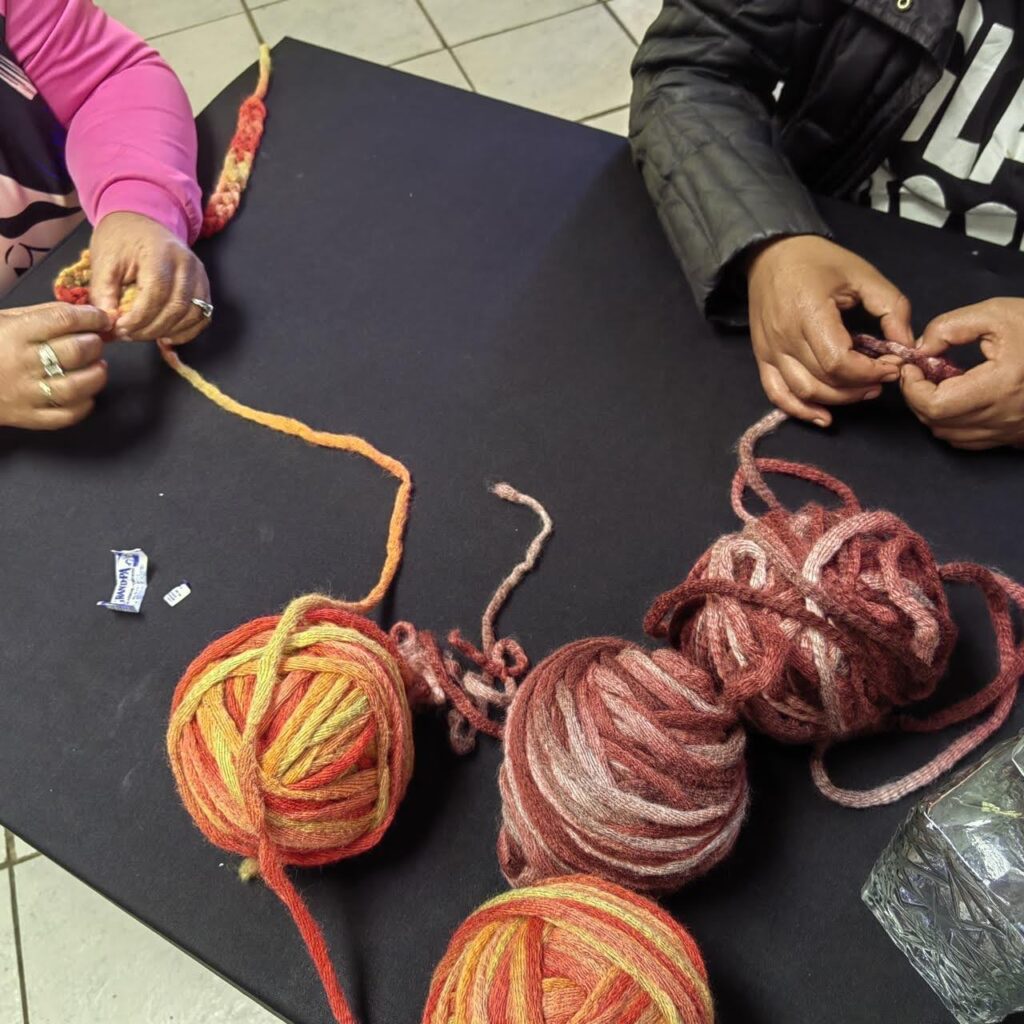
From August to November 2024, Lana Cavernelis used her Spark Grant to share the skill of Finger Knitting “Our goal is to empower women who remain so vulnerable and overlooked in our society by creating a sense of camaraderie and an opportunity for upskilling and connection.” Lana and her team hosted weekly workshops in George and a week-long workshop in Kimberley. The immediate benefit of the hand knitting workshops at the women’s shelter is that they provide a calming and therapeutic activity that helps reduce stress and anxiety. The workshops create a safe and supportive space where women can engage in creative expression, build confidence, and experience a sense of accomplishment. Additionally, learning a new skill empowers them with a potential income-generating opportunity,fostering independence and self-sufficiency.
The most significant change the hand knitting workshops brought about was a renewed sense of empowerment and hope among the women at the shelter. Many of them, having faced trauma and hardship, found healing through the meditative process of knitting, as well as a sense of community and support among their peers.
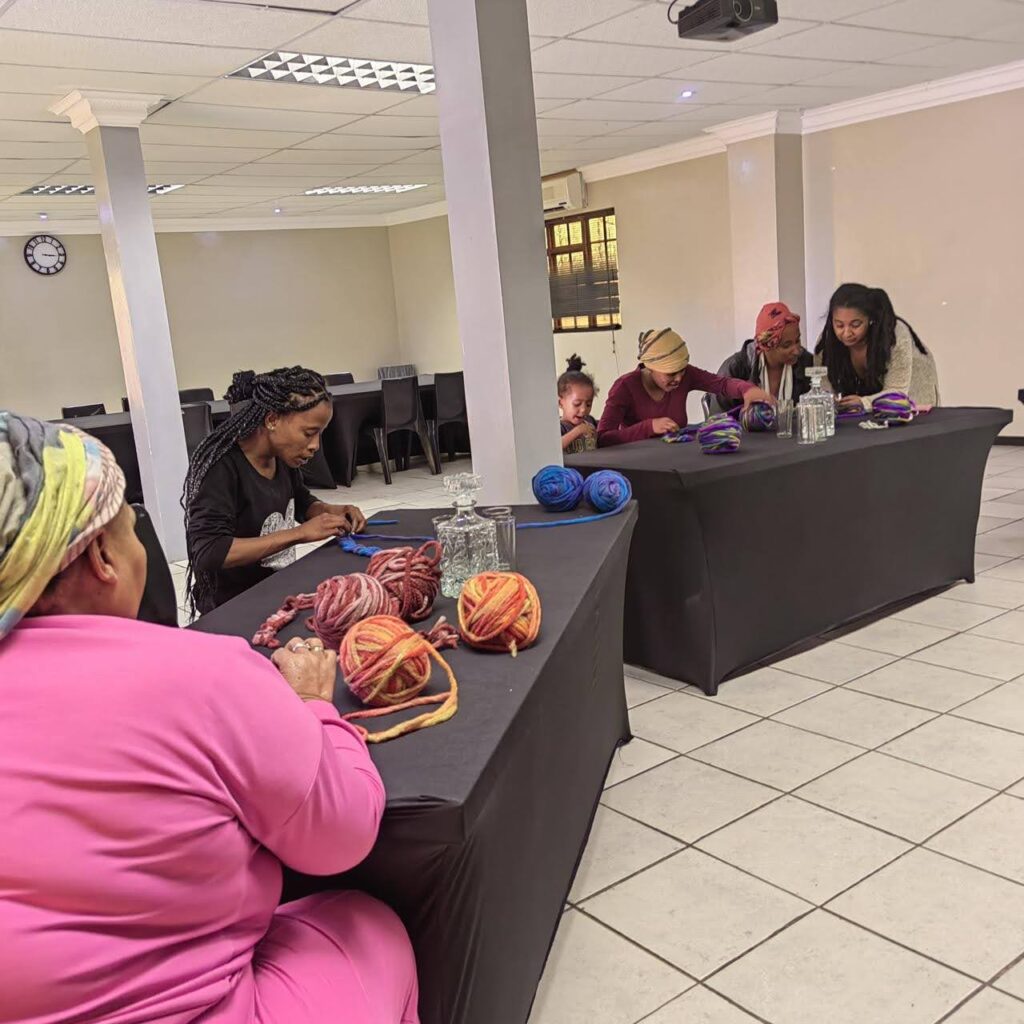
Threads of Continuity: Let’s make the Circle bigger
Monique Fagan
Communal Effort
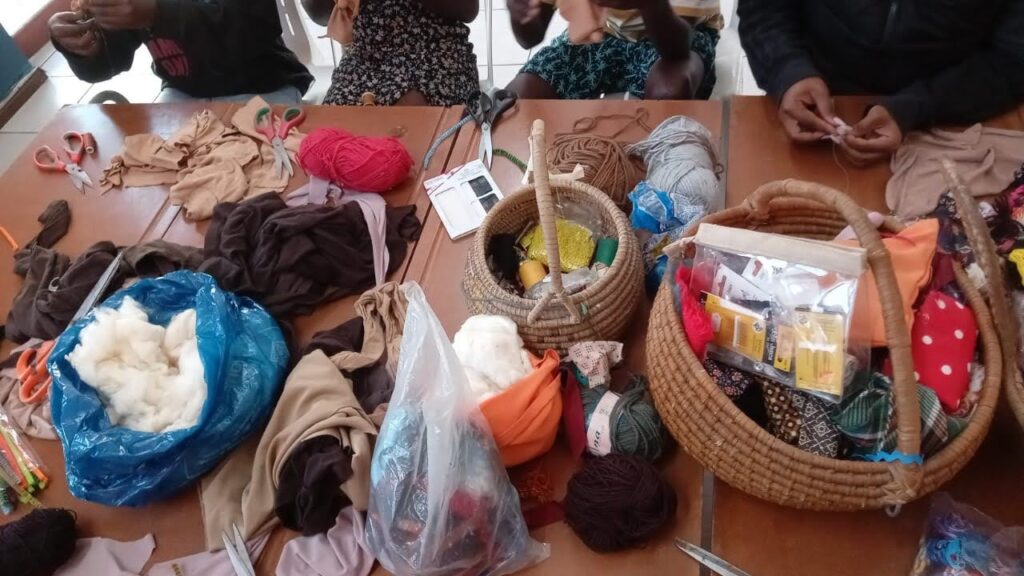
With the goal of cultural exchange and building community hubs, Threads of Continuity used their Spark Grant to host 2 workshops in Ocean view, facilitated by Lorraine Hendricks as well as workshops in Scarborough and Masiphumelele. “The women I’ve been working with over time felt empowered enough to say that they wanted to run their own workshops, and that they had some ideas of their own.” Reflected Monique Fagan, recipient of the Spark Grant.
In collaboration with Projekt Ubuntu – Connect, Threads of Continuity aims to create a meaningful reason for women to sit together, connect and empower one another. “Thread as women’s medicine emerged as a thread from RISE – Desert Rose (2023). There seems to be something innately therapeutic in sitting in a circle, sewing, it lends itself to sharing and takes people to a relaxed state of mind. Participants start humming, singing and sharing creating a continuous rhythm between them.” The next step for Monique and her team as they continue to “unravel the thread” is to gather the key players from each focus area together in a neutral space to introduce women from different communities together.
The focus of the project, defined by a “Let’s make the circle bigger” approach shifted from its initial scope, a broader concept of sharing space together, to bigger thread projects that could be taken home and continued outside of the sewing circle- a thread continually woven, transformed and shared!
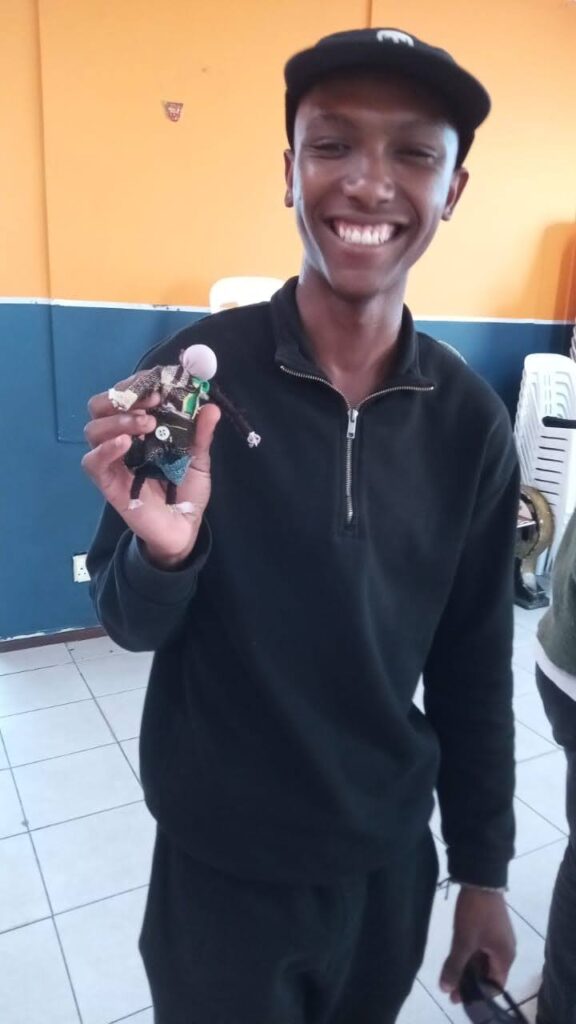
The KINOKADRE Community Cinema Circle Memory Camp and Training Workshop
Sapho Wulana
Radical Inclusion
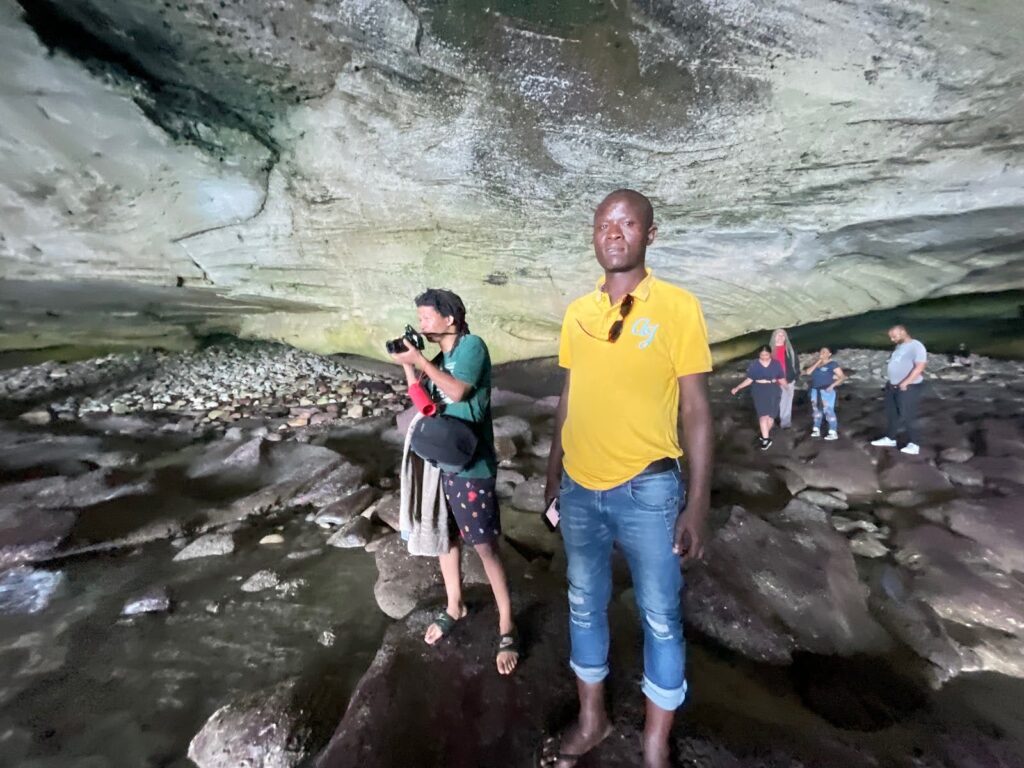
The KINOKADRE Community Cinema Circle Memory Camp and Training Workshop took place in Kassiesbaai, Arniston, a picturesque fishing village located three hours away from Cape Town. Arniston holds a special place in the heart of KINOKADRE, with its stunning views, captivating caves, and warm hospitality from the local community. The setting provided an ideal backdrop for the memory camp, allowing Sapho and her team to immerse ourselves in the beauty of nature.
KINOKADRE Community Cinema Circle went on a deeply reflective 4-day camp and training workshop in Arniston with 19 participants and have emerged with a profound sense of connection and purpose. This memory camp served as a tribute to their fallen KINOKADRE member, Aphiwe Tomose who got shot and killed in Khayelitsha in 2018, the courageous Anton Fransch, who tragically lost his life in a bombing in Athlone, Cape Town by the apartheid regime in 1989 and many more KADRES who have fallen in the struggle. Overall, the memory camp project in Arniston, combined with the training workshop for filmmakers and aspiring filmmakers, provided a comprehensive experience that encompassed emotional healing, community connection, legacy preservation, education, empowerment, skill development, networking, resource access, exposure to diverse perspectives, and collaboration opportunities for all participants involved.
“Through this experience, it became clear that there is a vital narrative that KINOKADRE needs to share with the world regarding the struggles and challenges endured by the people of Kassiesbaai. This realization marked a turning point in our understanding and commitment to amplifying the voices of those who have long been silenced”
The most significant change that the project brought about for KINOKADRE Community
Circles during the memory camp in Kassiesbaai, Arniston, was a newfound awareness of the
untold story of the injustices faced by the community.
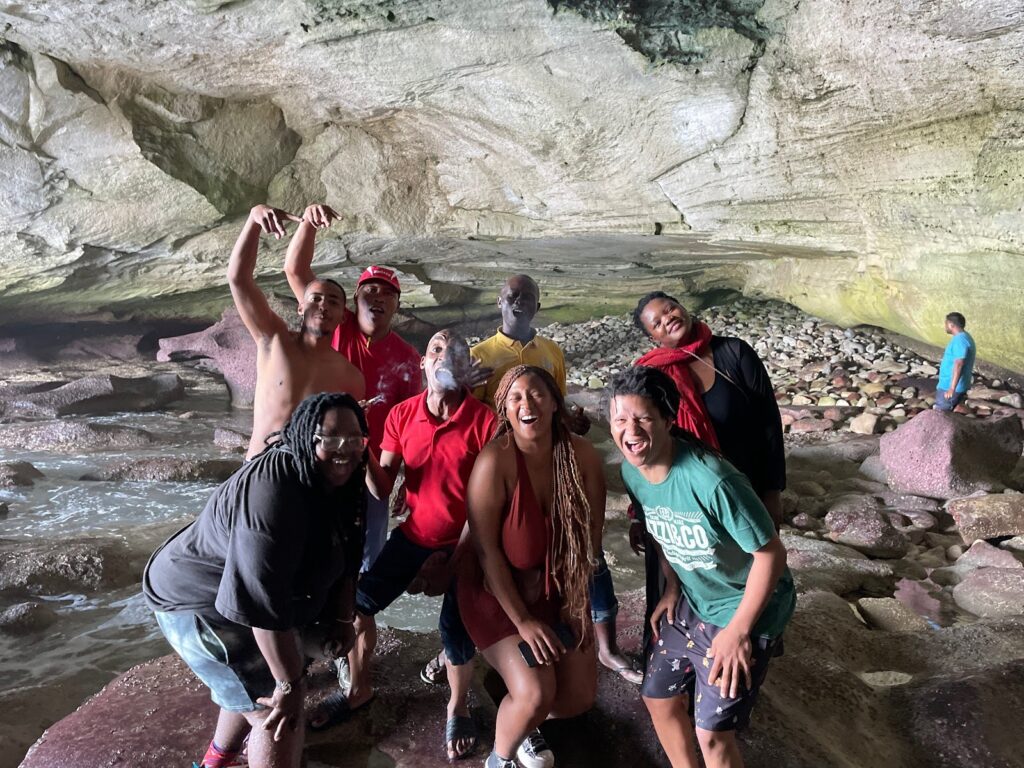
Maitland Mural Project
Monica Blignaut
Radical Self Expression
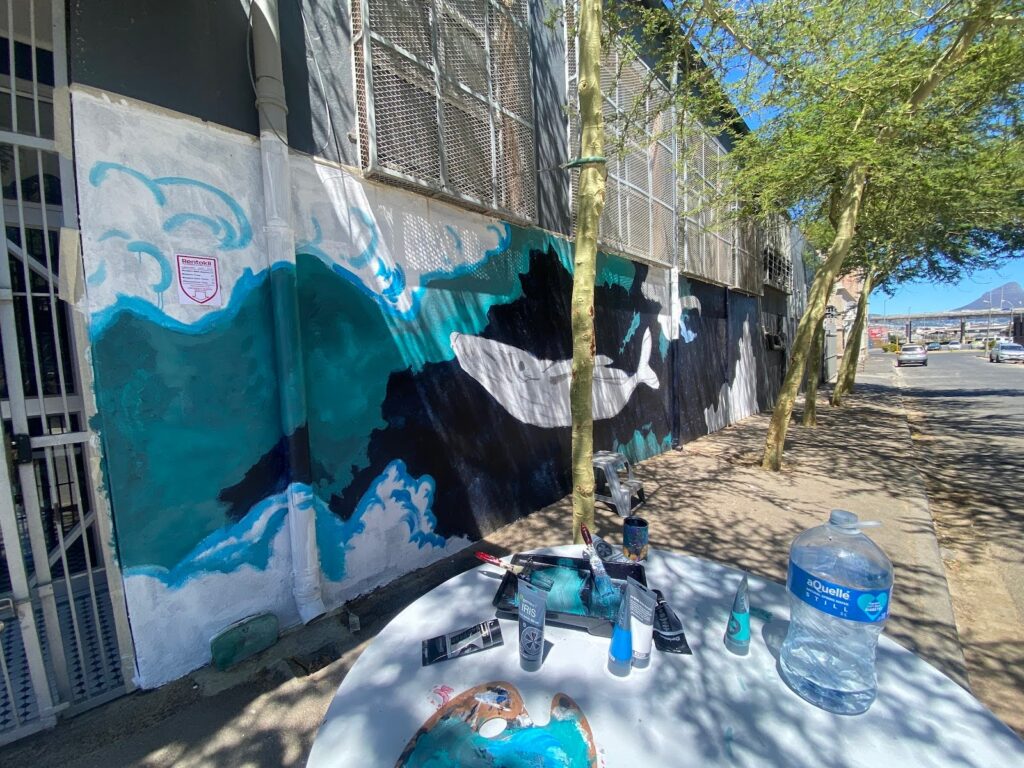
Taking place in Maitland, Cape Town with specific projects on Voortrekker road, Camp Road, Black River Parkway and Perth street, Monica Blignaut used her Spark Grant to activate Art in her community. Public art, particularly large-scale murals, serves multiple functions. Beyond beautification, it can deter crime, reduce vandalism, and create a safer environment. Murals transform neglected spaces into areas of pride, signaling to the wider community that these spaces are valued and cared for. This shift in perception can contribute to greater social cohesion, improved safety, and a more welcoming atmosphere for all.
Practice murals were created in October and November 2024 to get a good grasp of timelines and how much materials would be needed to create timelines and have examples to show the CID and city sectors. The project is ongoing and is active in the months of January 2025.
The Mural Project in Maitland aims to beautify and empower the local community through public art. The project will transform public spaces with murals that reflect the character and culture of Maitland, including a 360-degree ocean floor mural for a bathroom and colorful murals for the bus area. The project also seeks to engage local businesses and artists, encouraging collaboration and future mural installations.
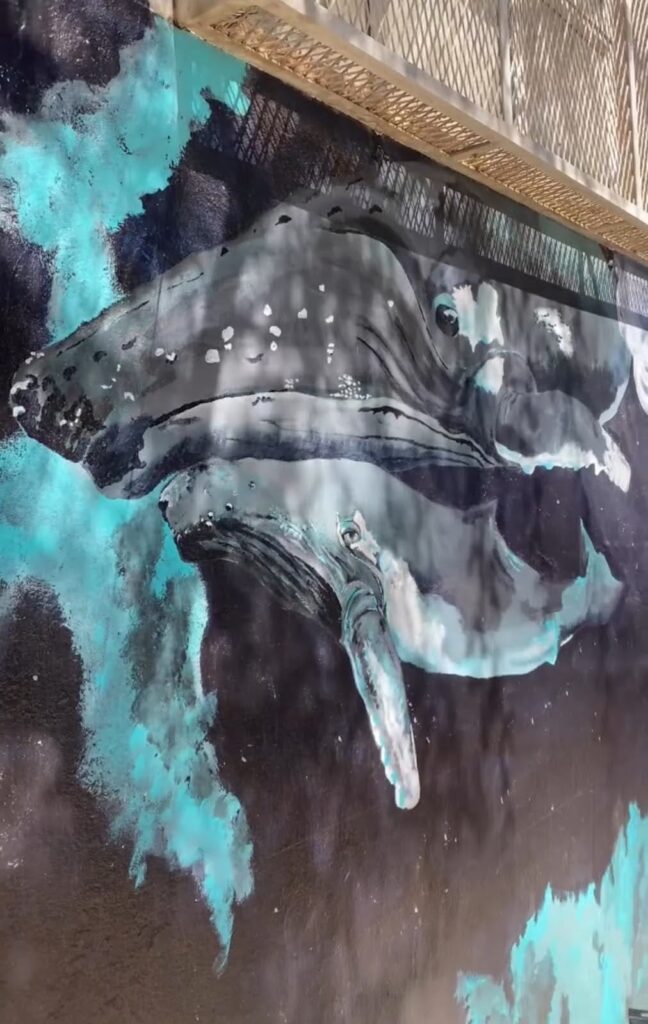
Re Mmogo Project
Thabiso Skosana
Each One Teach One
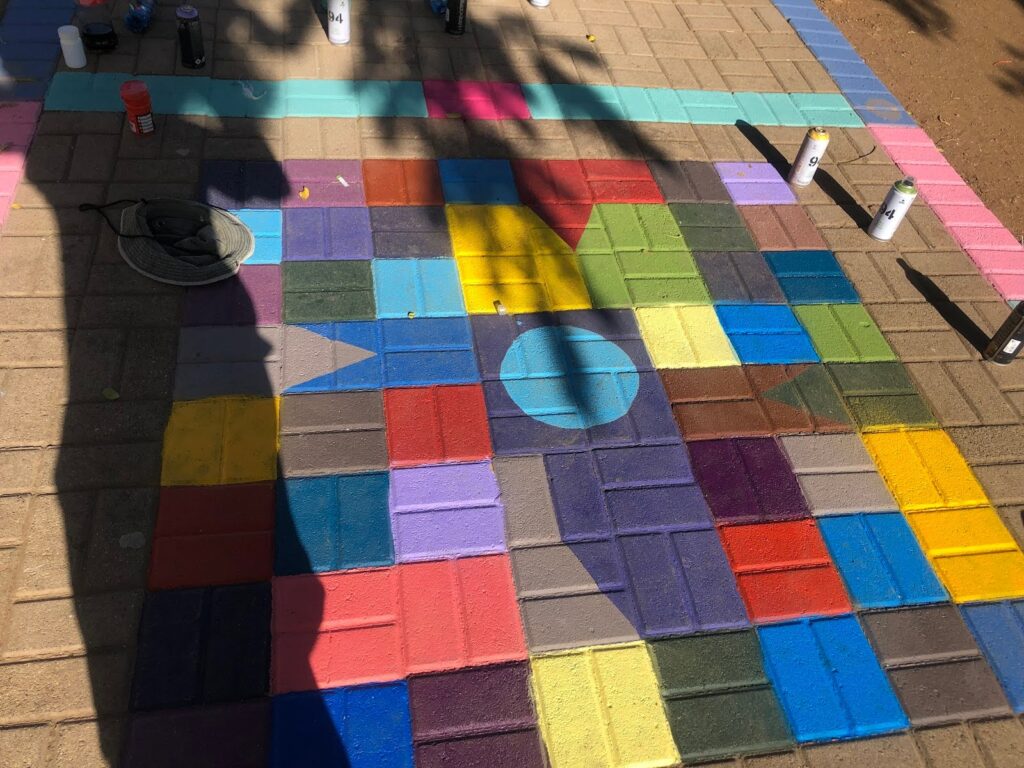
Thabiso Skosana used his Spark Grant to activate Each one Teach one, teaching and transferring the skills of Visual arts to young learners during school holidays: “The Re Mmogo project aims to bridge the gap between formal and informal education. Together with our community we can expand the reach of practical learning outside the traditional school system by inspiring upcoming artists and social cohesion.”
During the school holidays from 23-30 September 2024, Thabiso shared his skills of preparing and painting a large floor mural with primary school learners. The floor mural depicts indigenous board games such as Morabaraba and Diketo in an artistic and colourful rendering. The aim is for the children and community to play while learning about indigenous systems.
Beautifying public spaces and creating a sense of belonging for community members is the heart of Re Mmogo. The project prioritises the spirit of unity, recreational and cultural presence and preservation. Thabiso and two local artists on his team, worked with the Sediba sa Thuto primary school in the community of Mamelodi, holding a maximum of 20 learners. “I grew up in Mamelodi. I identify with the environment. Growing up, there were no art classes in most primary schools in the area up to this day. I am deeply connected with the people of Mamelodi as a community that raised me.”
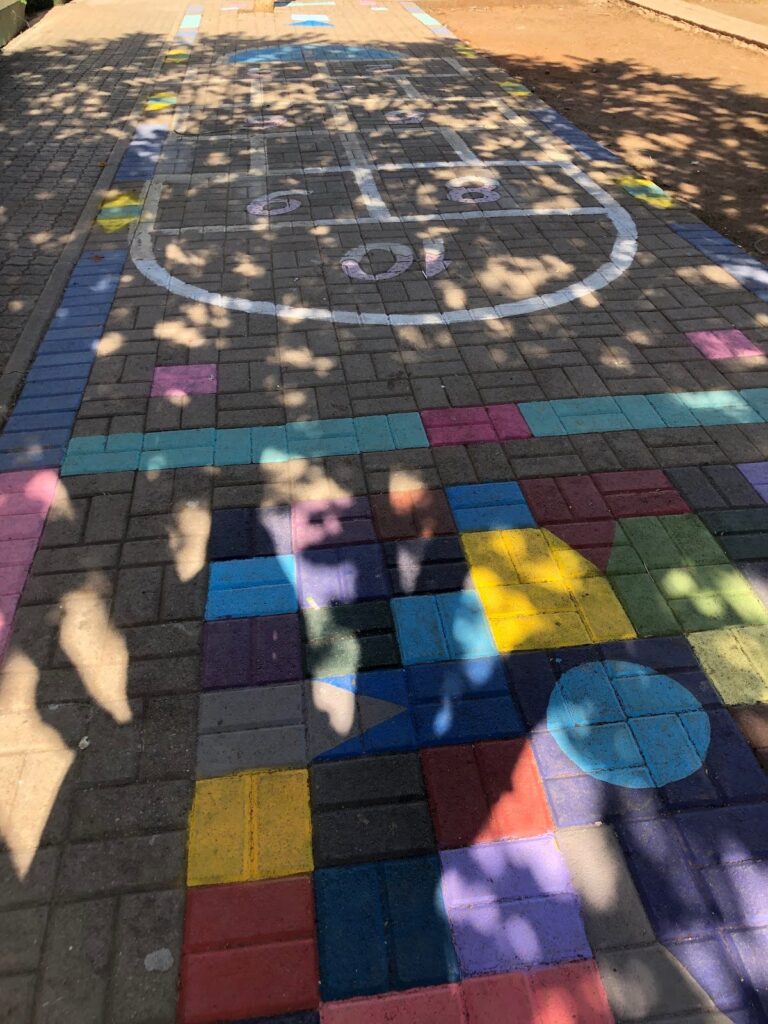
Play Park
Nikki Britz
Gifting
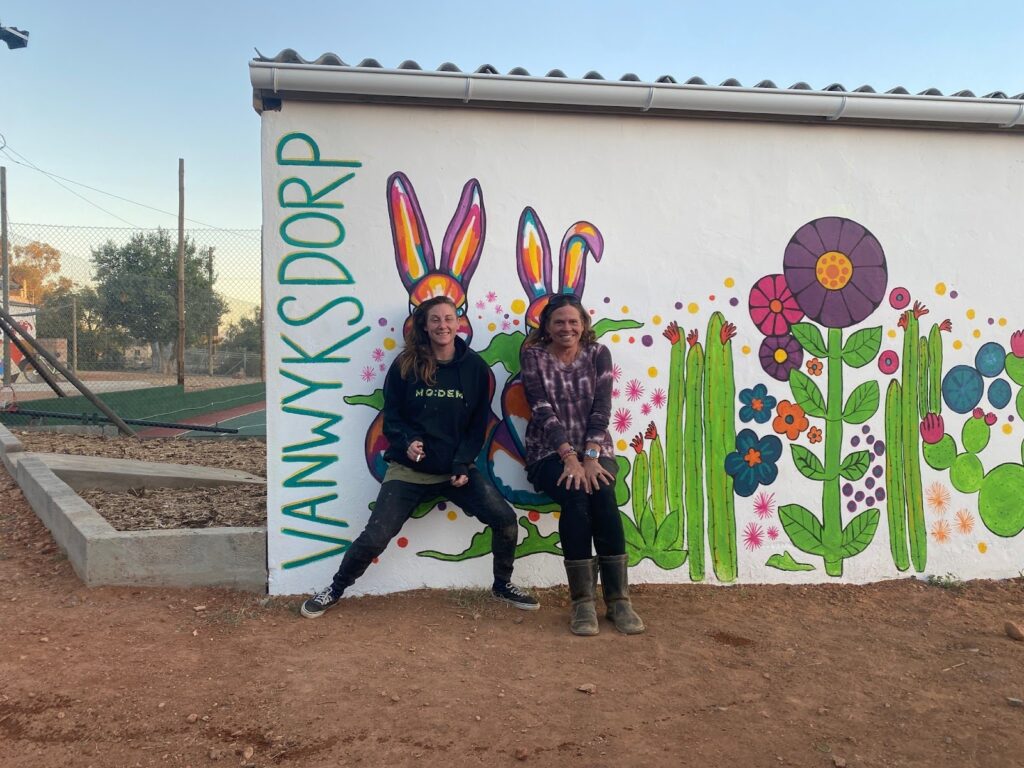
The original idea of the Play Park Project was to use their Spark Grant to build a jungle gym for the kids of Van Wyksdorp. However it was soon realised that this was not an option, as it was previously done by a local business but had to be taken down due to various issues and safety concerns. Sparking the Guiding Principle of Immediacy, Nikki and her team used the challenges they faced for innovation, creating a safe play park for their community.
“The idea of a Hopscotch was the first seed of the new plan. This is a great option as it helps children to learn counting, balancing, and coordination. It also improves their spatial awareness and problem-solving skills.” Hopscotch nurtures peer connections by encouraging social engagement, teamwork, and sportsmanship.
There has been a positive spin off of the community beginning to use the area. The community came on board and there is a bigger proposal being planned to upgrade the tennis courts and incorporate netball for the kids. A committee was created and an application to Lottoland was made.
The Play Park Project took place in an empty plot, the team had to start from scratch building the space. They cleared some land and trimmed back the trees to create a nice shady area. They installed concrete pavers and involved their community by asking local artists to paint the Hopscotch number and decorate the pavers.
Being December and 43 degrees most days made working outdoors an unfavourable option, they gathered at the Buffelsfontein Gallery and began creating. Even though the project took place over the Christmas period, the team members remained committed to their goal.
“It was definitely more work than we anticipated but to see the joy on the kids faces made it worthwhile.”
The reveal date was set for 2 January, 10am. Nikki and her team gathered in the new Play Park with ice cream cones for the kids. “Eventually word spread and we had about 30 kids come and play. They had a great time as we taught them the rules and variations of the game. Oasis Community Centre, and VDI, have since been taking the kids there regularly to play.”
With the remaining funds from the Spark Grant, the team bought swings. For safety reasons the installation of the swings was coordinated with VanWyksdorp Development Institute, an NGO uplifting the community who host the community’s kids at an aftercare and will supervise the Play Park.
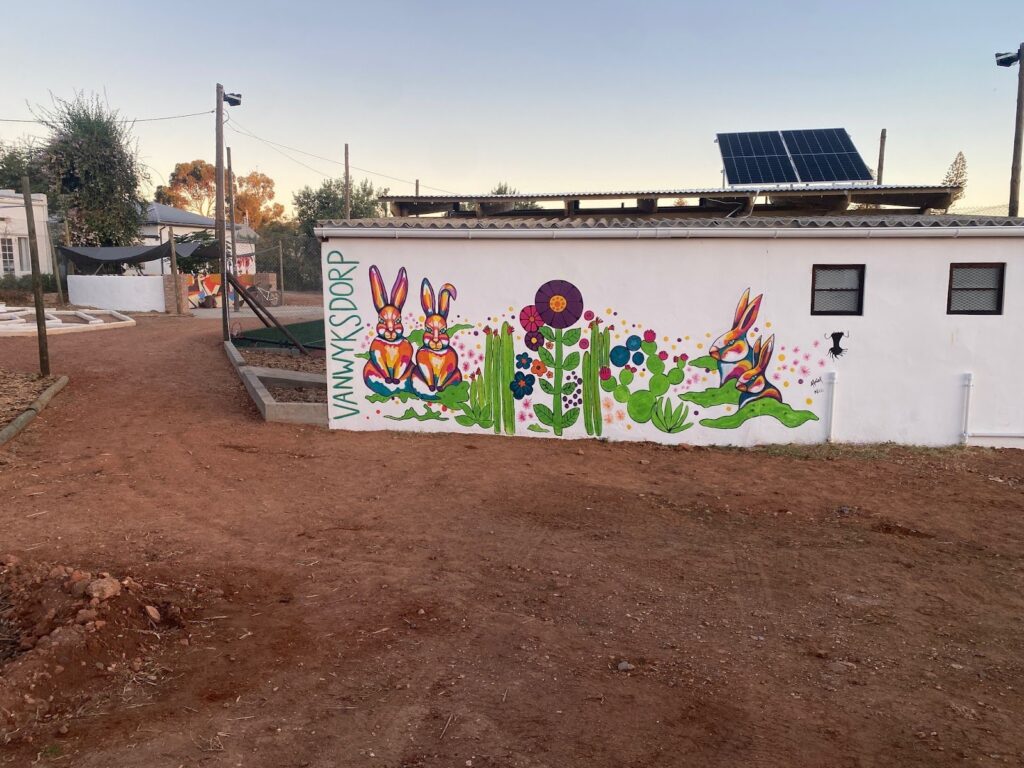
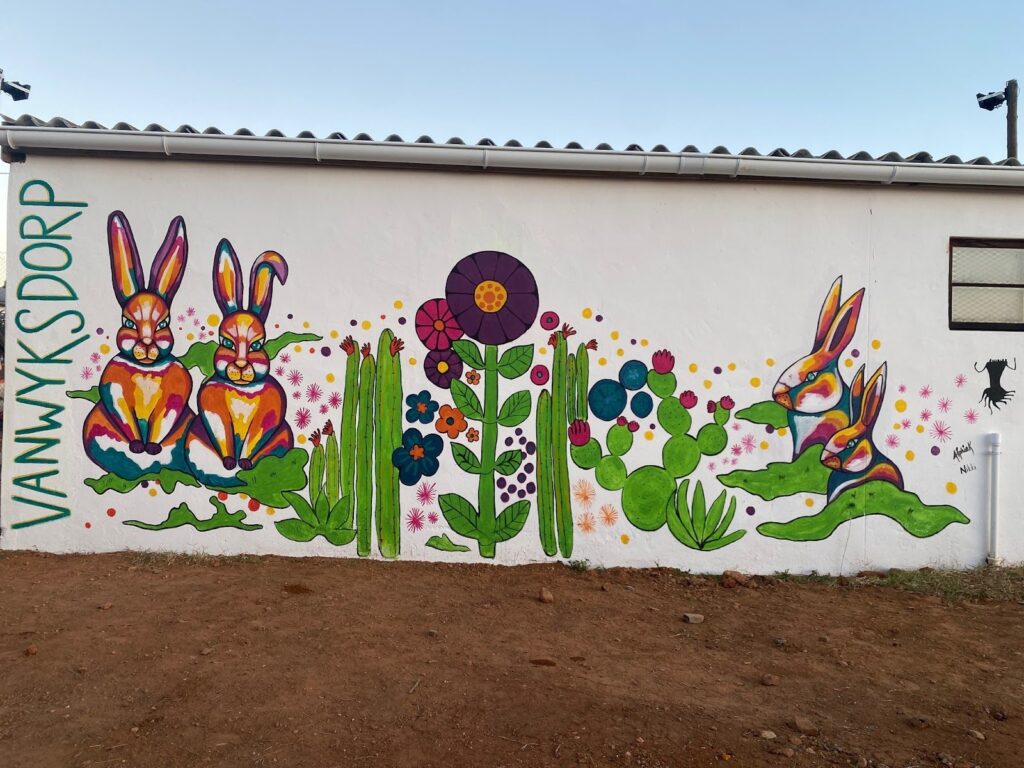
Road to Wuppertal – Die Einde van die Wereld Boskamp
Pieter Holtzhausen
Communal Effort
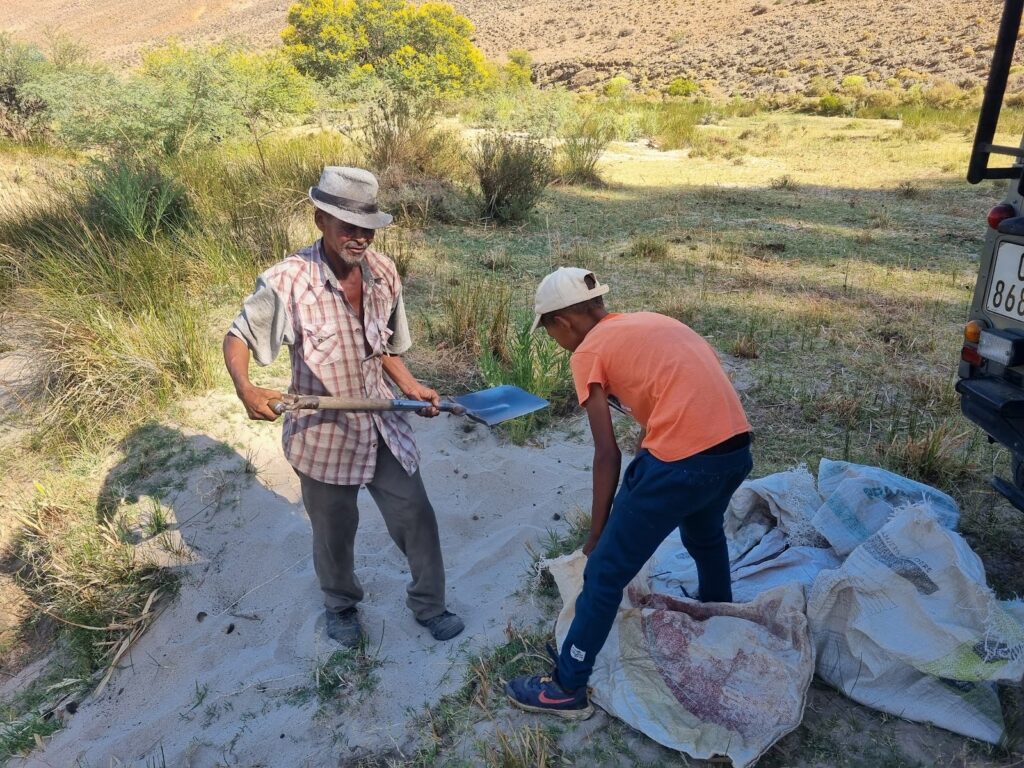
Taking place in Agterfonteinskloof, an outpost settlement close to Wuppertal, Cederberg, Western Cape, Pieter Holtzhausen used his Spark Grant to create: “Project Road to Wuppertal – Die Einde van die Wereld Boskamp”
“Our Spark Grant has helped us to build a stepping stone connecting Burners with nature after the Burn on the way to Wuppertal.”
Working with a community’s desire to create an eco tourism destination, Pieter and his team embraced the guiding principle of Communal Effort to build a bushcamp at the end of a dead end kloof called colloquially “Die Einde van die Wereld”. The bushcamp will now be a destination for 4×4 enthusiasts and motorcyclists to camp and be close to nature and connect with the community. This will also be a campsite for a group of Burners that will walk from the Tankwa to the Cederberg after this 2025’s Burn, Out Of The Blue, as a Decompression hike. The camp site has water and composting toilet facilities with a road that has been built to make vehicle access possible.
About 10 people live in Agterfonteinskloof and 50 people live in neighbouring village Nuweplaas. The entire population of Wuppertal and neighbouring communities count to be a few thousand. They will all possibly benefit from the future ecotourism potential of this site. The income generated from this potential business will be used to assist children of the community for transport to school hostels. Previously the road to Agterfonteinskloof was a wrong turnoff for travellers. Now it has the potential to be a destination where you can connect with nature and with the community.
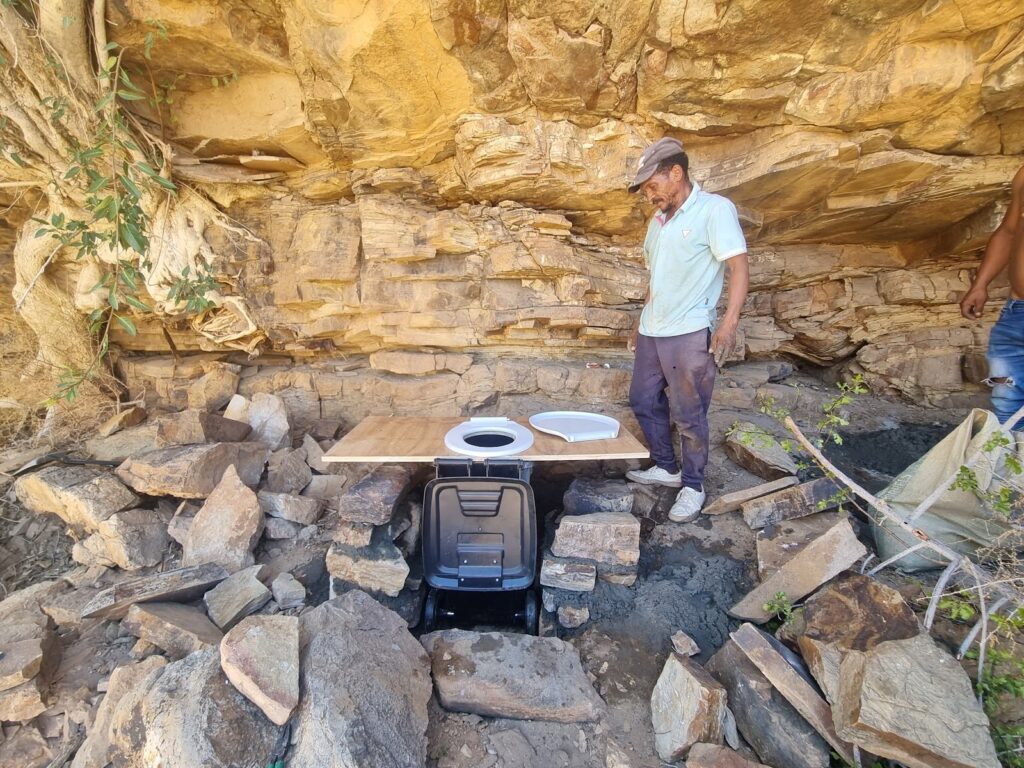
Vape Shape Project
Leave No Trace
Kelly Franciscus (and Micheal Connors)
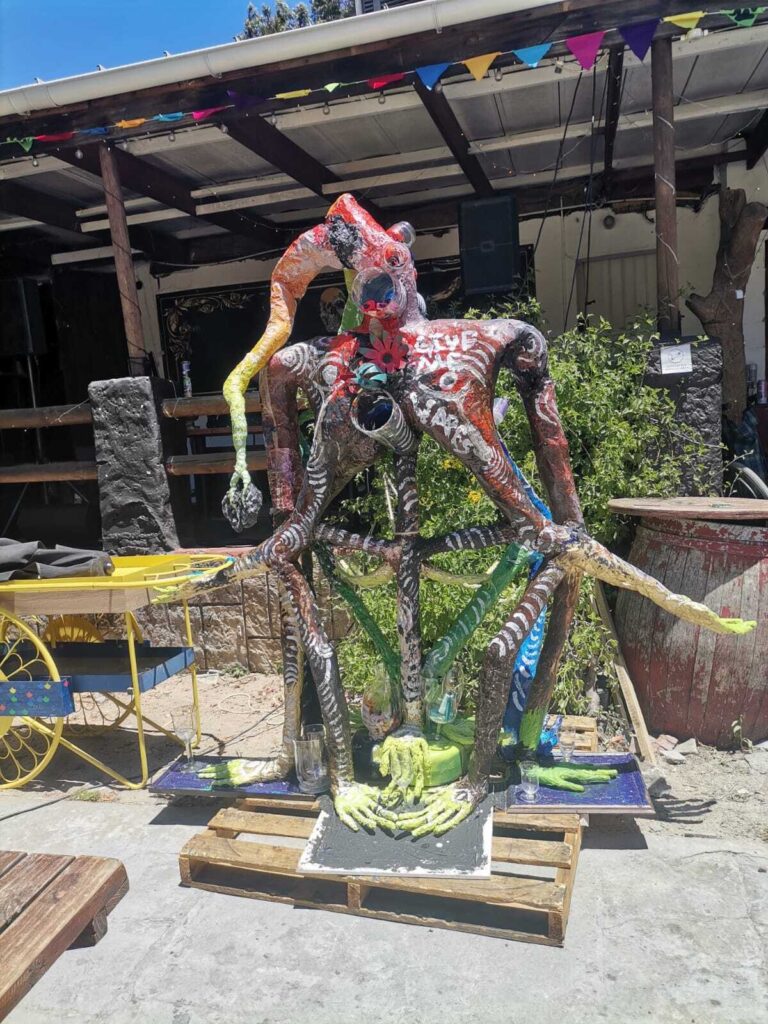
The Vape Shape Project activated the AfrikaBurn guiding principles of Leave No Trace, Participation, Communal effort and Civic Responsibility. Kelly Franciscus and Micheal Connors used their Spark Grant to create a sculpture calling for awareness of the harm caused by vapes on the environment and the damage caused in Congo where lithium is mined.
Working on the sculpture from September to November, Micheal and Kelly displayed the sculpture at Streetopia. Instead of shaming viewers, the team chose to spark participation and communal effort to lessen our human trace on the environment and hold space for the conversation about Congo.”It is time to let go of the boxes of vapes hoarded at home and contribute to creating art! Currently there is no solution to reuse- reduce- recycle electronics vapes leaving many people looking either to dispose of used vapes or create something with them. We wanted the sculpture to give those people an creative and learning opportunity”
With multiple bright colours and fruity flavours, almost every teen and adult holds a lithium powered device on their person, most of which are termed “one use” and “disposable”- or so the vapes declare. In reality vapes are difficult to dispose of since they are declared “hazardous waste”. The Vape Shape project confronts consumerism and the harm on both vape users and the environment, while serving as an Ode to the Congo.
The production of vapes has caused strife in the Congo due to the mining of Lithium. It is our responsibility as human beings, especially those who purchase vapes, to understand the repercussions and ally with those who are suffering and do our part to heal the damage. Although there is not yet a lasting solution to the recycling or reuse of vapes, the Vape Shape project found a creative solution to introduce the conversation of inclusive action.
“We hope that having an artwork an audience can participate in and contribute to by adding their own vapes will create awareness and hopefully reframe the current ‘innocent’ perspective on vapes.”
Ubuhlobo Makhanda
Ntomboxolo Priscilla Donyeli
Each One Teach One
The Ubuhlobo Makhanda project, led by Ntomboxolo Priscilla Donyeli and her team sparks the Guiding Principles of Each One Teach One, Radical Self-expression and Radical Self-reliance in the default world. By fostering a culture of creativity and leadership, the project aims to help the community of Makhanda voice their vision for the world and their place in it. “We feel creative guidance can uplift Makhanda by nurturing artistic expression and impactful development pathways for real-world issues such contaminated water, a lack of services and social isolation addressed by our approach.”
Ubuhlobo Makhanda raises awareness of local concerns using mime, puppetry, and masks, igniting discussions and building relationships. “With technology and creative thinking evolving rapidly, young people need the tools to express their thoughts and feelings.”
Being an artistic tiny town, Makhanda uses plays and other artistic outlets to draw attention to issues and unite its community. Artists, who are frequently ignored but have a significant impact, are essential in mobilizing Makhanda to address these urgent challenges.
Through the empowerment of young people to spearhead advocacy and shape their preferred future, this project creates a new world. Providing the opportunity to take initiative with their own projects and collaborate with leaders and establishments, the youth will acquire spaces for self-governance and self-reliance. The Ubuhlobo Makhanda project aims to have a lasting positive impact by teaching young people the tools they need to become active community leaders and advocates. “By giving youth the tools and spaces to voice their ideas, we cultivate a generation of informed, engaged citizens. This initiative will strengthen community bonds, drive social change, and inspire continuous improvement in Makhanda, creating a resilient, vibrant future.”
Eco-Arts Innovations: Giving Life to Recycled Material
Mischka Lewis
Leave no Trace
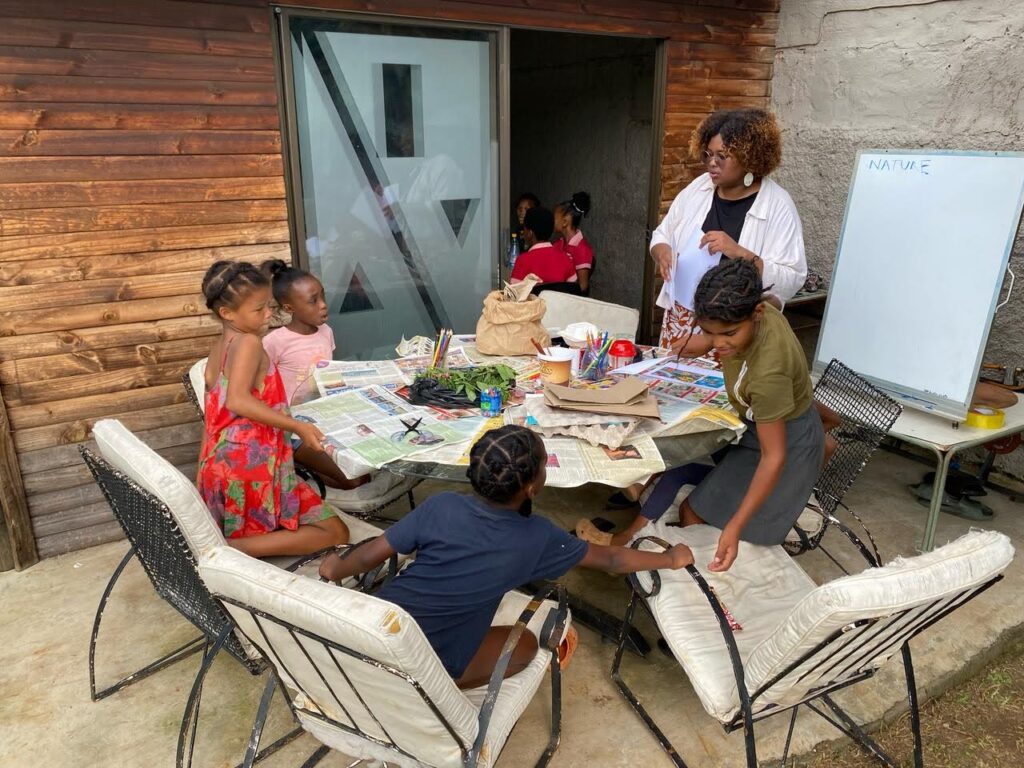
On February 27th 2025, Mischka Lewis used her Spark Grant to ignite “Eco-Arts Innovations: Giving Life to Recycled Material”, a one-day Eco-Art workshop where underprivileged and orphaned children create art with recycled materials. The purpose of the workshop is to educate school children on recycling and environmental awareness using creative hands-on activities to repurpose the cardboard, plastic and tin cans found in their community.
Taking place at Sizo Community Restoration Centre in Johannesburg, Eco-Arts Innovations collaborated with Sizo Community Restoration (SCR), a community outreach organisation which provides meals to underprivileged communities, houses orphaned children and assists with various other social development needs of the surrounding community. Together, Eco-Arts Innovations and SCR were able to host a workshop for 20 children and 7 adults.
South Africa faces a critical waste management crisis, with millions of tons of plastic and other waste polluting our streets, rivers, and oceans. Studies show that 90% of South Africa’s waste is not recycled, contributing to water contamination and environmental degradation.
“At Eco-Art Innovations, we believe that education and creativity are powerful tools for change. By equipping young learners with knowledge and skills in eco-conscious art, we empower them to become environmental advocates in their schools and by extension communities.”
With the help of their Spark Grant, Eco-Arts Innovations were able to educate learners on the importance of protecting the environment, sustainable practices, self expression, communal responsibility, and how to transform waste materials into meaningful artwork.
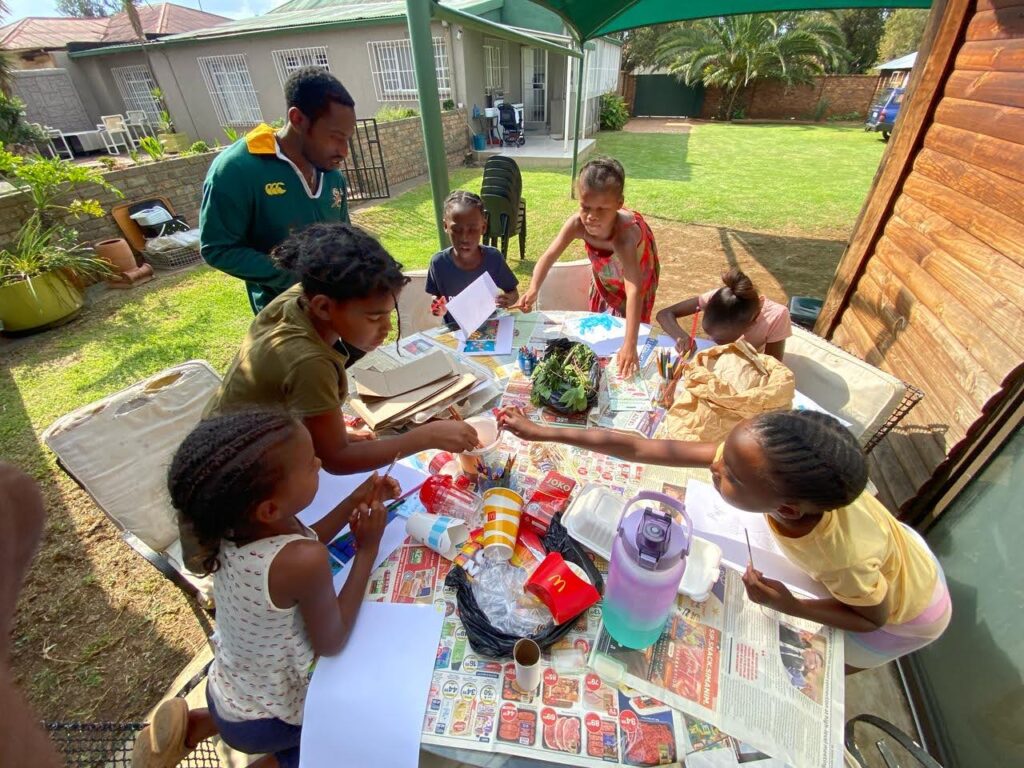
If you’re inspired by these stories, and want to spark something yourself, go check out the Spark Grant form, and (if it’s open) you can submit your idea. Please note that the Spark Grant application window is between 1 and 30 June 2025. Click here to access the form.

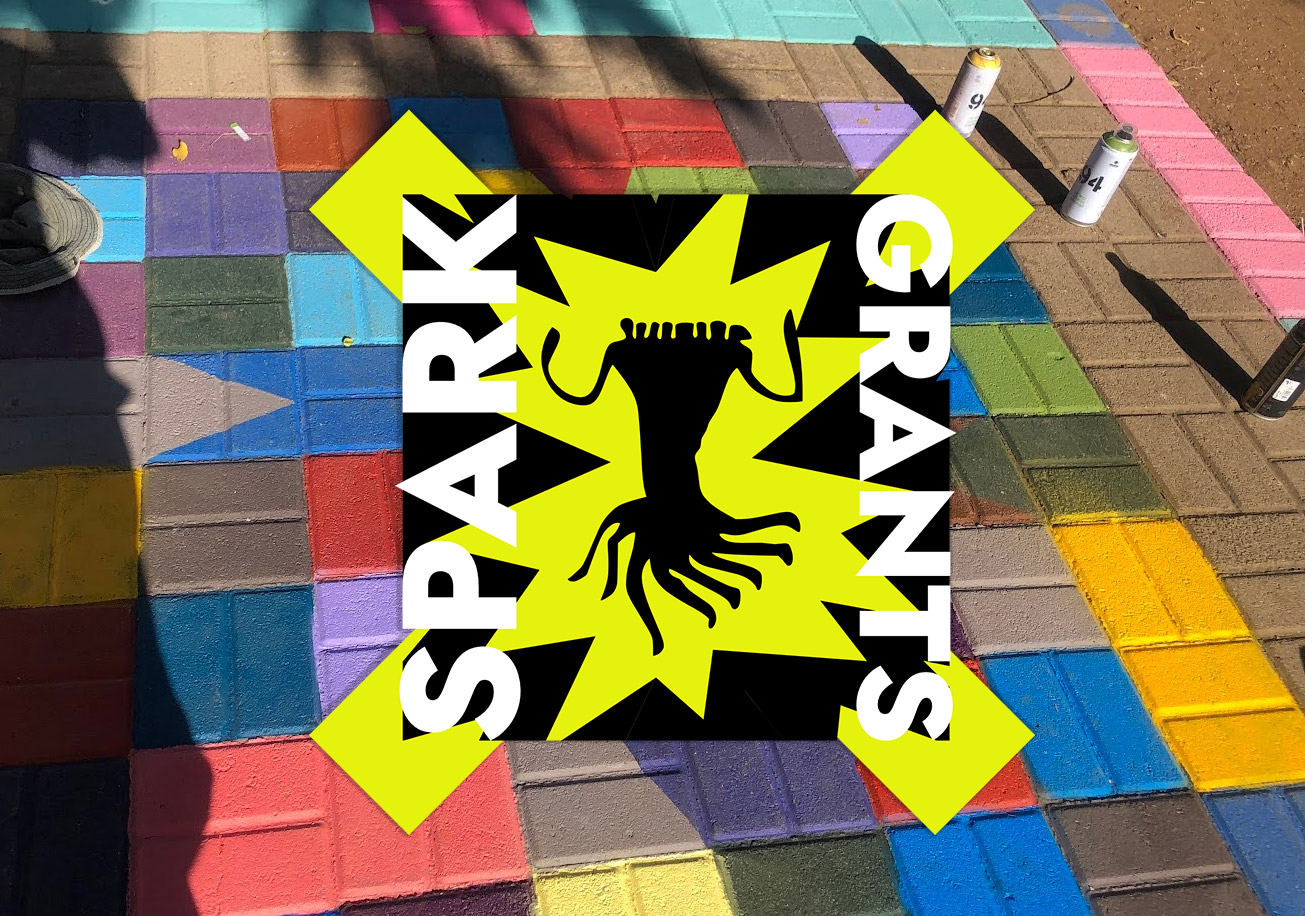
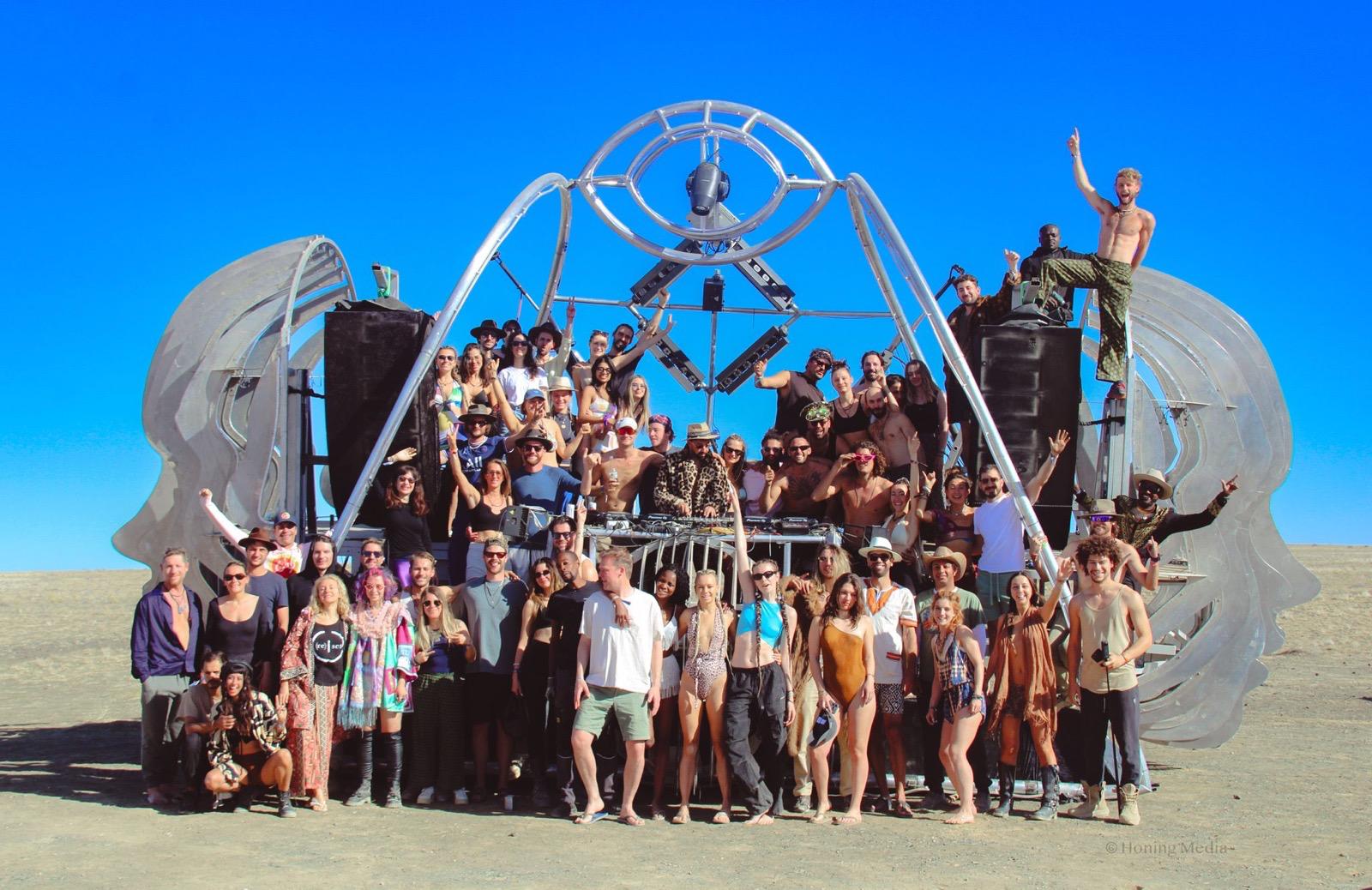
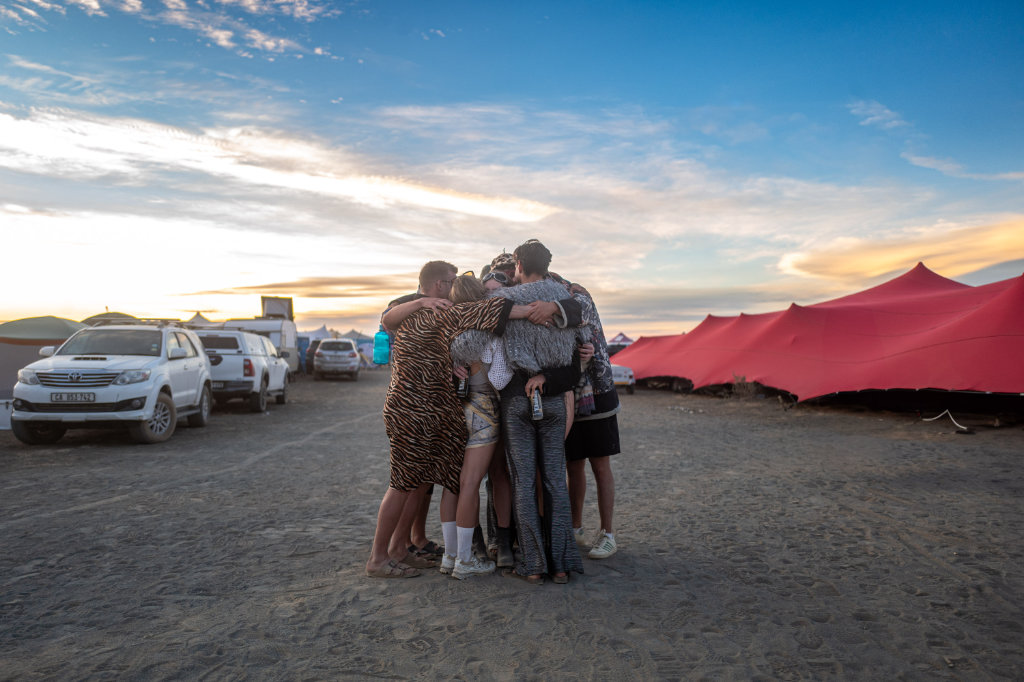
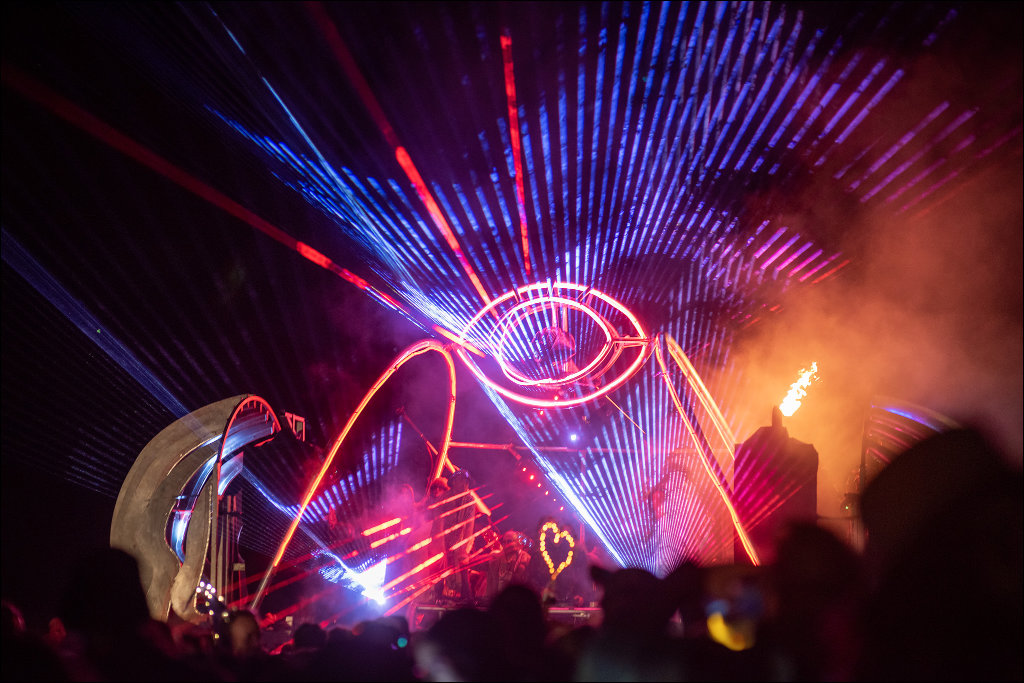
One Response
I would love to apply for a Spark Grant next time.